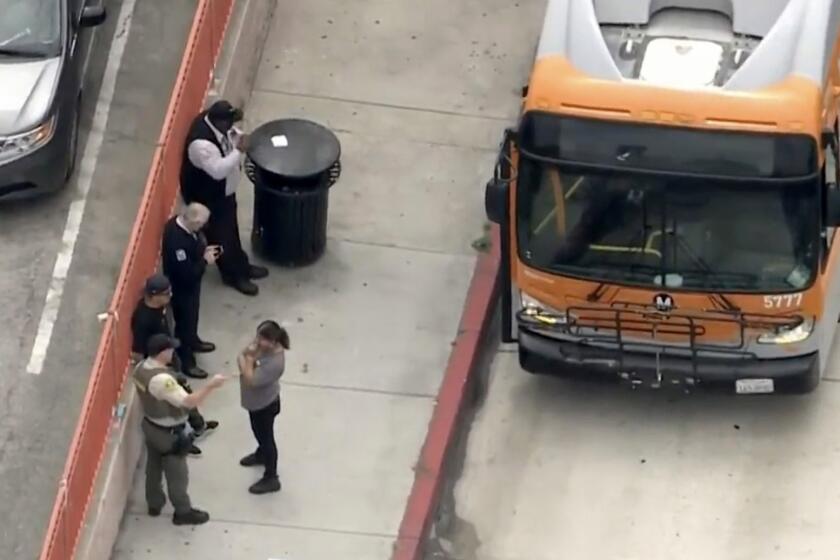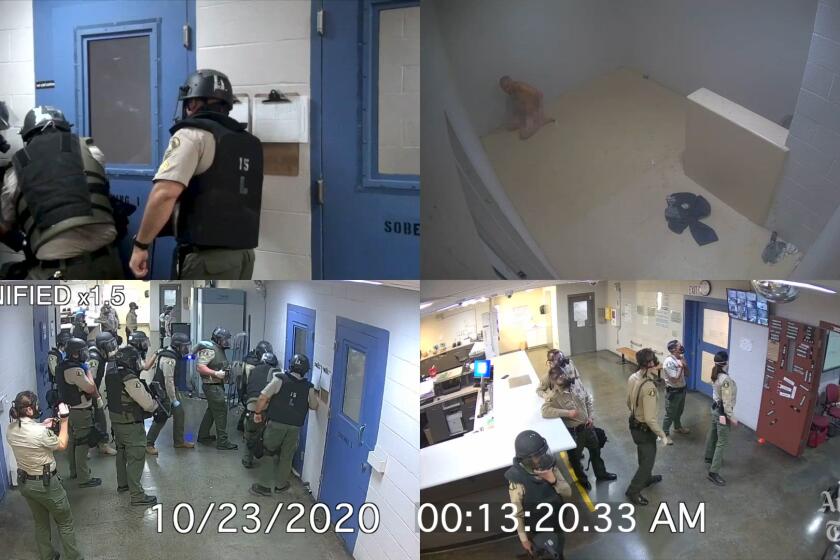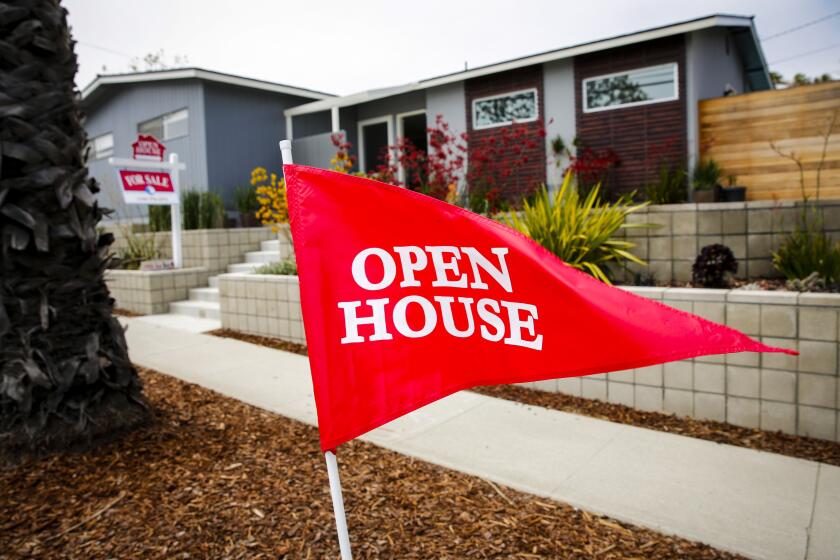Ex-Skinhead’s Unlikely Alliance
Even among his fellow skinheads, Tom Leyden stood out as an angry warrior.
Leyden recalls prowling the streets of Redlands at night, pummeling “blacks, Hispanics and longhairs” with his steel-toed boots. In the Marines, he kept a copy of Adolf Hitler’s “Mein Kampf” next to his bunk. At home, he hung a Nazi flag over the baby’s crib.
Leyden, 30, might seem like a dubious candidate to lead a crusade against white supremacists. But this tattooed high school dropout has broken with a racist past and joined ranks with an unlikely ally--the Simon Wiesenthal Center.
It is a rare and unexpected alliance.
Leyden is the first skinhead to voluntarily lend his expertise to the Wiesenthal Center since it opened in West Los Angeles 19 years ago. Skeptical leaders of the center--a watchdog organization that fights anti-Semitism and other forms of racism--greeted his arrival last month with suspicion. Was he a spy, they wondered?
But Leyden offered inside information about neo-Nazi methods: how they recruit young members by inciting racial violence on school campuses and by distributing music that preaches the death of Jews, blacks and other groups.
He also recounted his disillusionment with a movement that labeled his own mother inferior because she was handicapped. He spoke about the angst of watching his sons--ages 4 and 2--grow up as hatemongers saluting the Nazi and Confederate flags.
And he recounted his decision to leave his wife of six years for a chance to redeem himself.
“I got the impression that this was a person who has had a profound change of heart and who is willing to tell the world, ‘I was wrong,’ ” recalled Rabbi Marvin Hier, the Wiesenthal Center’s founder. “He is saying, ‘Everything I’ve stood for in the last decade was for nothing.’ That’s admitting to a life’s mistake.”
Now the Wiesenthal Center and Leyden are putting his firsthand knowledge of neo-Nazi activities to work--a plan that has earned Leyden a “traitor” label among former skinhead associates.
The center has arranged for Leyden to address a national hate conference in Miami in October. Leyden also is scheduled to speak about hate groups in the military during an upcoming visit to Fort Bragg, the North Carolina Army base where swastikas were found last month painted on the doors of rooms occupied by black soldiers.
And, within days, Leyden is expected to begin sharing his information on the Internet.
“Skinheads love to hate,” the San Bernardino County resident said of the philosophy he followed for more than a decade. “They feed each other on anger. When you’re in the movement, you don’t care about how much pain you inflict on anybody.”
*
Leyden was not born a bigot.
He grew up in a close-knit Irish Catholic family in Fontana, the oldest of three boys who attended church regularly. It was a disciplined, working-class home where the blond Leyden and his brothers were required to be present for dinner every night and be back inside by curfew at nightfall.
“It was middle America,” said Leyden’s mother, Sharon, 48. “We were just like every other family on the block.”
The only harbinger of the racism to come, Tom Leyden recalled, was a grandfather who told him as a teenager “never to bring a ‘darkie’ home.”
Life began to unravel around age 15, when Leyden’s parents divorced. Leyden dropped out of school and began hanging out with punk rockers. On weekends, he’d escape the shouting at home by running off to concerts where he could vent his rage by slam-dancing and fighting.
“I could release anger against people and they wouldn’t care,” he recalled. “Probably every show I went to, I punched somebody in the face.”
Leyden’s penchant for violence won him friends among skinheads at the shows, and he began hanging out with them, adopting their violent attitudes.
Soon he helped start a skinhead group with about 20 teenagers in Redlands.
“We’d drive down the street and if we saw a black kid or Hispanic kid, we’d throw beer bottles at him or yell a racial epithet,” he said. “If he yelled back at us or flipped us off, it was reason enough to stop the car, get out and beat him up.”
At 21, Leyden joined the Marines and turned his attention to recruiting. He showed fellow soldiers videos about supremacist groups such as White Aryan Resistance, an organization founded by nationally known racial separatist Tom Metzger. He played the music of groups with names like Brutal Attack and Screwdriver.
Leyden earned his high school diploma at night. But the Marines kicked him out with an “other than honorable” discharge, citing off-duty alcohol-related incidents and his association with skinheads.
Back home, he married a woman introduced to him by friends. (The two had corresponded by mail during his military service.) The young family actively participated in white supremacist activities, attending “Aryan youth fests” in Idaho and at one point planning an “Aryan Fest” near Barstow. Leyden began recruiting on school campuses for several neo-Nazi groups, including Hammerskin Nation, and earned a reputation as a shrewd operator.
“He was a nice young guy. Sharp,” recalled Metzger, who met Leyden at various white power gatherings. “I liked the guy.”
During his 13 years as a skinhead, Leyden was arrested three times, once on suspicion of possessing a loaded firearm, court records show. The other arrests were for drunken driving. He never served any jail time, instead paying fines and performing community service.
Leyden’s family rejected his neo-Nazi involvement and refused to entertain his discussions about such topics as the Holocaust being a hoax.
“I hated it and he knew it,” recalled his mother. “I couldn’t condone what he did. He went against everything that was a part of me.”
Leyden began to question his life after his sons were born.
It bothered him that his small children gave the Nazi salute. What he saw at home bothered him too.
One incident in particular crystallized his growing concerns: His sons were watching television one day when the oldest abruptly turned the set off as a program came on featuring African American actors.
“Daddy,” the boy said, “we’re not allowed to watch shows with Negroes on.”
Leyden stepped back.
“All the stuff I had been perpetuating was coming out in my son,” he said. “He’s not going to be a doctor finding a cure for cancer. He’s not going to be a lawyer on the Supreme Court. He’s going to be a mindless bum beating people.”
Leyden faced other troubling dilemmas. He knew the teachings of the white power movement called for a new world order in which minorities were eliminated. But handicapped people and police officers (often referred to by white supremacists as Zionist Occupational Government storm troopers) also would have to be done away with. Leyden’s mother walked with a pronounced limp from polio, and his brother, Phil, was a police officer.
The questions ultimately drove Leyden out of the movement. In April, he announced that he was giving up his neo-Nazi ways. Soon after, he and his wife split. He also decided to seek custody of his boys. His wife, reached by phone, declined to comment.
All along, Leyden had not thought about contacting the Wiesenthal Center. His mother did that for him. She was concerned that he might return to his old ways, so she called the organization, which she had seen on news shows a few times.
*
Soon, Leyden was telling his story to a hate-group specialist at the center and arranging a meeting with its rabbis.
Leyden’s involvement with the Wiesenthal Center has brought scorn from his former friends and associates, including Metzger, who called him a “traitor.”
“The Wiesenthal Center is an obvious enemy,” Metzger said. “Anyone who would work with them is an enemy. It’s just like Benedict Arnold.”
Metzger questioned whether Leyden’s change of heart is actually a facade, designed to curry favor with the courts amid a child custody battle. Leyden denies the accusation.
Leyden’s family now fears for his safety. He said late-night callers frequently hang up or leave obscene messages.
“You’re involved in this. You know things happen. So you gotta be prepared for things to come back your way,” he said.
But Leyden refuses to let the threats scare him. During his last visit to the Wiesenthal Center, he asked its associate dean, Rabbi Abraham Cooper, about arranging a visit to a synagogue.
Cooper, obviously pleased with the request, even floated the idea of Leyden attending a service during the upcoming High Holy Days.
“I think Tom has already removed the tattoos inside,” Cooper said. “He’s made some really severe errors. But he has my respect, which is the last thing I thought I’d be saying about someone who spent years in the skinhead movement.”
More to Read
Start your day right
Sign up for Essential California for news, features and recommendations from the L.A. Times and beyond in your inbox six days a week.
You may occasionally receive promotional content from the Los Angeles Times.






